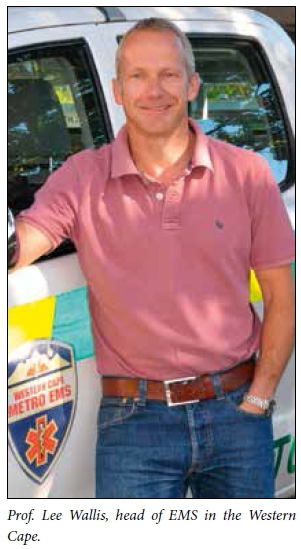Services on Demand
Article
Indicators
Related links
-
 Cited by Google
Cited by Google -
 Similars in Google
Similars in Google
Share
SAMJ: South African Medical Journal
On-line version ISSN 2078-5135
Print version ISSN 0256-9574
SAMJ, S. Afr. med. j. vol.106 n.8 Pretoria Aug. 2016
http://dx.doi.org/10.7196/samj.2016.v106i8.11227
IZINDABA
Emergency medical service workers struggle in violent election climate
Two of South Africa's leading emergency medical service (EMS) chiefs and government advisors last month backed the Gauteng Department of Health's call to protesting communities to allow emergency rescuers into volatile environments to save lives and treat injured people.
Mr Raveen Naidoo, National Director of EMS and Disaster Management, and Prof. Lee Wallis, also a senior government disaster/ EMS advisor (and EMS chief in the Western Cape), said that their staff were frequently endangered and ambulances or other rescue vehicles hijacked or damaged during civil unrest such as protests over lack of service delivery. Their appeal came in mid-June as civic protests, many of them related to the upcoming municipal elections, erupted in Pretoria, East London, Port Elizabeth and Bronkhorstpruit with civilian killings, buses burnt, major roads barricaded and civilian vehicles stoned.
While neither EMS advisor had any reports of staff injuries at the time, both said that in some provinces the hijacking of ambulances was more frequent, with denial of access to township areas widespread. Wallis said that the hijacking of rescue vehicles and ambulances, in order to strip them for vehicle parts, and protestors blocking emergency crews were common and 'bother us on a weekly basis'. This 'stressed out' their crews and affected service delivery. In late May, in KwaZakhele township, Port Elizabeth, protests turned violent when residents learnt that their party list candidates had not made the cut, while widespread protests over taxi operating permits a fortnight later blocked major roads around all major Eastern Cape metropolitan areas, with dozens of people arrested and injured and vehicles damaged and/or burnt. On 14 June at Zithobenia township near Bronkhorstspruit, some 45 km from Pretoria, EMS staff were blocked from reaching a diabetic patient during protests over alleged election list nominations. Also, a resident with a rubber bullet wound could not be helped immediately. Roads in and around Pretoria were blocked, causing traffic mayhem. Neither patient outcome is known to Izindaba.
Gauteng MEC for Health Qedani Mah-langu urged members of the public not to attack and block EMS staff from accessing and exiting from communities or locations during protests. This not only endangered the lives of EMS personnel but also deprived members of the community of critical services. She added: At all times there is a need to minimise loss of lives and prevent long-term complications due to emergency care being delayed unnecessarily.' She implored members of the community to allow staff to do their work without hindrance.
With much of the civic hostility directed at 'imposed' candidates for the upcoming August municipal elections, the Independent Electoral Commission (IEC) expressed grave concern at the rising levels of violence and intimidation characterising political and campaign activities. It said that incidents of what appeared to be politically motivated murders, assaults and other forms of intimidation of candidates were reported across a number of provinces, including Gauteng, KwaZulu-Natal, Mpumal anga and North West, over the last weeks of June. Condemning the violence, intimidation, destruction of property and intolerance, the IEC said they had no place in a country with a constitution based on respect for human rights, the rule of law and democracy. That some of the acts were carried out under the guise of 'defending democratic processes' was 'all the more shameful and incongruent with our democracy', it added, calling on political leaders and candidates to speak out strongly against any conduct that undermined conditions conducive to free and fair elections. It singled out the involvement of party members and supporters in such actions, saying that political leaders were 'ultimately responsible'.
Naidoo said that EMS staff country wide had guidelines on how to manage situations during endemic civil strife. To reduce loss of life and mitigate health complications, they trained community members in first aid, liaised with community leaders and police and set up perimeter pick-up points. They also had standing instructions to withdraw from volatile environments if there were any signs of danger. 'Going in is an informed decision based on the stability of the situation and police presence. Quick response by the community and timely response and treatment by EMS are critical factors that influence patient outcomes,' added Naidoo. He said that staff sometimes entered highly volatile areas without SAPS escorts. EMS management had also engaged with ward councillors and the communities in an attempt to address the unfortunate spate of attacks on EMS personnel. 'We want them to take ownership of these ambulances, as they serve the very communities that will be adversely affected by the delay in response times to calls in the affected areas,' he said. The Eastern Cape EMS went as far as notifying all radio stations and local newspapers of the incidents in order to raise awareness, and appealed for help from all stakeholders in protecting EMS personnel. All staff who been subjected to 'these heinous crimes' had been debriefed through the Employee Assistance Programme, he added.

Chris Bateman














